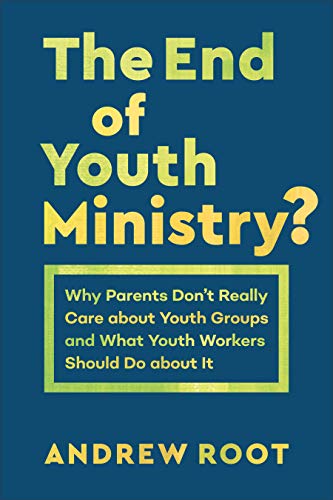The End of Youth Ministry? (Why parents don’t really care about youth groups and what youth workers should do about it)
By Andrew Root
Review by Kathryn Kane:
There is an underlying niggle in the back of most youth workers (and children’s workers) heads that parents and carers have a list of things that are regarded as way more important for the young person in their life than the church youth ministry you provide. This book suggests that it is probably true!
Underpinned by the question ‘What is youth ministry for?’, Andrew Root tracks the changes in parenting styles from the 1980s, where parents gave young people space and freedom to do their own thing, through to today’s helicopter parents, who hover over and micromanage every aspect of their child’s lives. Having been parented during the 1980s, becoming a parent in the 1990s and teaching teenagers until fairly recently, I felt his broad-stroke analysis of parenting styles was interesting and accurate. It drew me back to some of the cringey moments of my teenage years and some of the better, worse and funny moments of parenting my own daughters.
Root says that parents today are anxious to protect their child from hurts, ensure that their child is academically successful, and make sure that they experience a wide range of extracurricular activities so they don’t miss out on any opportunity to find their identity through their ‘thing’. He points out that parents want ‘good’ for their children but the current focus on protecting them and trying to make sure they always experience happiness and success has slowed their emotional development and emergence into the adult world. As a teacher I have seen this first-hand.
If you are looking to Root to tell you which style of parenting is best, you will be disappointed. He is non-judgemental of these societal changes in parenting and does not suggest one decade’s method is better than the other, instead he takes the role of a commentator. However, he suggests the current style of parenting has impacted youth ministry in two main ways. Firstly, parents’ ambitions for their child’s material success and growth, rather than their spiritual growth, means that church youth ministry will always come second to revision classes, football, and other more niche activities such as bassoon lessons. Secondly, when parents do encourage their child to attend youth ministry there is pressure from them to make sure that the youth worker is running a programme that will be based on fun and making sure their child will be happy, avoiding engaging in deep relationships where they may experience stories of hardship and sadness.
At times this book felt a bit turgid in getting to the essence of what Root perceived as the true purpose of youth ministry. However, in setting out his exploration of different views, from the perspective of ‘factional’ characters and families he engaged with, he shone a light on many commonly held views about its purpose. Finally, in the last few chapters of the book, Root reveals what he considers the purpose of youth ministry: the joy (not happiness) that comes from friendship – friendship with God and others – and an openness to journey and listen to the stories of other young people and adults as they look to see God in the everyday of their lives. If you are willing to stick with some of the more theoretical chapters of this book, I thought that Root offered a hopeful vision of how life-affirming and joyful youth ministry can be.
The book raised questions to reflect on:
- Roots book is set in middle-class American society. What would a ministry of joy look like in the UK, across the diverse landscape of the Diocese of London?
- Is youth ministry just for young people? To what extent should youth ministry engage with the parents and adults who care for them?
- How do we shift from youth programmes that focus on fun or try to compete on the same playing field with a host of other extracurricular activities to a youth ministry of joy with deeper friendships with God and others?
Kathryn Kane is the Secondary School RE, Chaplaincy and Collective Worship Advisor for the LDBS and also works with the Youth and Children’s team, building links between churches and schools.
